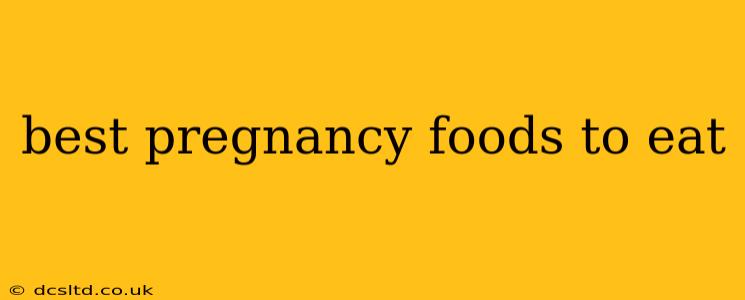Congratulations on your pregnancy! Nourishing your body with the right foods is crucial for both your health and the healthy development of your baby. This guide explores the best pregnancy foods to eat, addressing common questions and providing a comprehensive overview of essential nutrients.
This isn't just about eating more; it's about eating better. Focusing on nutrient-dense foods will support your growing baby and help you manage common pregnancy discomforts.
What are the most important nutrients during pregnancy?
During pregnancy, your nutritional needs significantly increase. Key nutrients include:
- Folic Acid: Crucial for preventing neural tube defects in your baby. Found in leafy green vegetables, legumes, and fortified cereals. Your doctor will likely recommend a folic acid supplement.
- Iron: Supports increased blood volume and oxygen delivery to your baby. Good sources include red meat, spinach, lentils, and iron-fortified foods. Iron absorption is improved when consumed with Vitamin C.
- Calcium: Essential for building strong bones in both you and your baby. Dairy products, leafy greens, and fortified foods are excellent sources.
- Protein: Supports the growth and development of your baby's tissues and organs. Lean meats, poultry, fish, beans, lentils, and eggs are all great choices.
- Iodine: Important for thyroid hormone production, which is crucial for your baby's brain development. Seafood (in moderation), iodized salt, and dairy products are good sources.
- Vitamin D: Plays a vital role in calcium absorption and bone development. Fatty fish, egg yolks, and fortified foods are good sources. Sunlight exposure also contributes to Vitamin D production.
- Omega-3 Fatty Acids: Essential for brain development and reducing inflammation. Found in fatty fish like salmon, tuna, and mackerel. Flaxseeds and chia seeds are plant-based alternatives.
- Zinc: Supports cell growth and development. Found in red meat, poultry, beans, and nuts.
What foods should I avoid during pregnancy?
While focusing on the foods to eat is key, it's equally important to be aware of foods to avoid or limit:
- Unpasteurized dairy products, soft cheeses, and raw or undercooked meats: These can carry harmful bacteria like Listeria, which can cause serious illness.
- Raw fish and shellfish: These can contain parasites and mercury, which can be harmful to your baby. Cook seafood thoroughly.
- High-mercury fish: Limit consumption of fish high in mercury, such as swordfish, king mackerel, and tilefish.
- Alcohol: Alcohol consumption during pregnancy can cause Fetal Alcohol Spectrum Disorders (FASDs). Avoid alcohol entirely.
- Caffeinated drinks: Limit caffeine intake to moderate levels, as excessive caffeine can be associated with complications.
- Unwashed fruits and vegetables: Thoroughly wash all produce to reduce the risk of foodborne illnesses.
What are some healthy pregnancy snack ideas?
Healthy snacking is vital for managing hunger and preventing cravings for less healthy options. Some excellent options include:
- Fruits: Apples, bananas, berries, oranges – a great source of vitamins and fiber.
- Vegetables: Carrots, celery sticks with hummus, bell peppers – provide essential vitamins and minerals.
- Yogurt: A good source of calcium and protein. Choose plain yogurt and add your own fruit for sweetness.
- Nuts and seeds: Provide healthy fats, protein, and fiber.
- Hard-boiled eggs: A great source of protein and choline, essential for brain development.
Are there any specific foods to help with morning sickness?
Morning sickness affects many pregnant women. While there's no magic cure, some foods can help alleviate symptoms:
- Bland foods: Crackers, toast, rice, and plain pasta can be easier on the stomach.
- Small, frequent meals: Eating smaller meals more often can prevent nausea.
- Foods high in carbohydrates: These can help stabilize blood sugar levels.
- Ginger: Ginger ale or ginger candies can help soothe nausea.
How much weight should I gain during pregnancy?
The recommended weight gain during pregnancy varies depending on your pre-pregnancy BMI. Consult your doctor or midwife for personalized guidance on healthy weight gain during your pregnancy.
What are the benefits of eating a healthy diet during pregnancy?
A healthy diet during pregnancy offers numerous benefits for both you and your baby, including:
- Reduced risk of complications: Proper nutrition can reduce the risk of gestational diabetes, preeclampsia, and other pregnancy-related problems.
- Healthy baby development: Provides essential nutrients for your baby's growth and development, including brain development.
- Improved energy levels: Proper nutrition can help combat fatigue and boost your energy levels.
- Easier postpartum recovery: A healthy diet can aid in postpartum recovery and breastfeeding.
Remember to consult with your doctor or a registered dietitian for personalized dietary advice. They can help you create a meal plan tailored to your individual needs and preferences, ensuring you and your baby receive the best possible nutrition throughout your pregnancy. This information is for general knowledge and doesn't replace professional medical advice.
